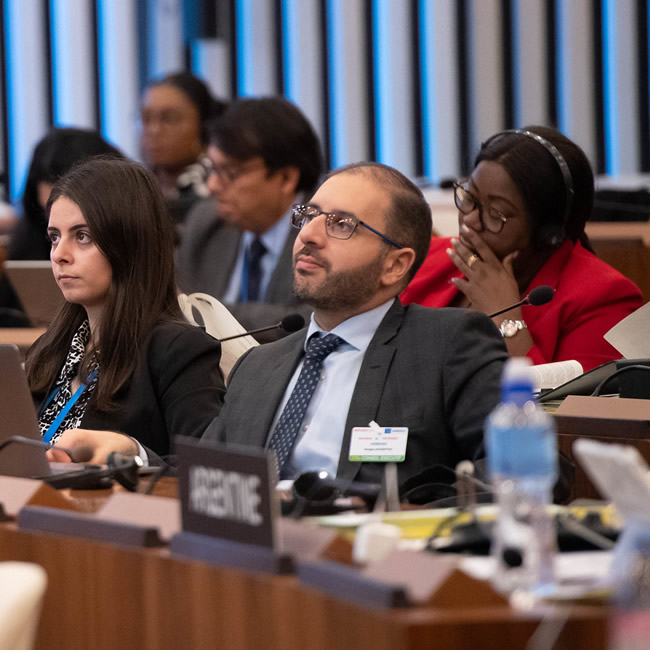« First G-20 Education Working Group Meeting concludes in Chennai, India | Main | The National Press Club, Washington DC, is now Accepting Entries for the Best in Journalism Awards »
February 4, 2023
UNESCO leads the Global Dialogue on regulating Digital Platforms and combating Disinformation and Hate Speech

Photo: UNESCO Headquarters, Paris. A Session of the Unesco Executive Council. October 12, 2022. Image provided by & Copyright © UNESCO/Cyril Bailleul. [File Photo]
Paris, February 3, 2023 — As part of its Mandate, UNESCO has launched a global dialogue to provide guidelines for regulating digital platforms, fighting disinformation and hate speech, and protecting freedom of expression and human rights. The high point will be an international conference organized at the Organization’s Paris headquarters on 21-23 February. It will result in the presentation by UNESCO in mid-2023 of Global Guidelines for Governments, Regulatory Bodies, and Digital Companies.
“The call is now coming loud and clear from all quarters. It is time to address one of the defining questions of our age, with implications for democracy and human rights worldwide: the challenge of how to support States in developing principles and rules for digital platforms so that they enable freedom of expression and promote the availability of accurate and reliable information,” UNESCO Director-General Audrey Azoulay remarked.
• A flawed Business Model needs Correction.
Social media and other digital platforms have empowered people worldwide to communicate, share information, and transform their societies. But increasingly, these platforms are breeding grounds for disinformation, hate speech, and conspiracy theories. In recent years, the issue of monitoring and moderating content has been essential in violence, insurrection, marred elections, and democratic transfers of power in scores of countries, UNESCO said.
Studies show that people often prioritize engagement at any cost. It leads to algorithms favoring the most controversial content because it triggers the most reaction, despite the evidence that this content can damage the fabric of the societies, sowing distrust, helping to seed extremism, and undermining fundamental human rights. Moreover, there appear to be vast imbalances between regions and languages, with moderation resources sometimes distributed based on financial or political interests or far too late in response to public outrage once violence or election meddling has already occurred, UNESCO explained.
• Global Issues require Global Guidelines.
Many countries are advancing regulations to respond to these issues, but this needs to be coordinated and more cohesive, with some countries outside the international norms on freedom of expression. Given the global dominance of a limited number of players, the need for a consistent global approach has never been more pressing than right now.
As the United Nations agency for communication and information issues, UNESCO is leading global consultations on this topic, involving governments, regulatory bodies, digital companies, academia, civil society, and UN agencies. This international Dialogue will culminate in the first global conference specifically focused on guidance for regulating digital platforms from February 21 to 23, 2023. Thousands of representatives from these groups are already registered to participate.
UNESCO experts will then incorporate the feedback received during these discussions and engage in new consultations to finalize and publish the first global guidelines on the topic in mid-2023. With UNESCO’s expertise and support, governments, regulators, digital companies, and other groups would use these guidelines to implement policies and tools as needed.
UNESCO’s initiative responds to the call from the UN Secretary-General in “Our Common Agenda” to address the spread of disinformation and the denial of scientific facts, which poses “an existential risk to humanity.”
• UNESCO’s Mandate to provide Guidelines for Regulation.
UNESCO has a global mandate, enshrined in its constitution, to promote the free flow of ideas by word and image. It leads UN action to promote freedom of expression and access to information. It includes a decades-long history of providing guidance to and promoting cooperation between broadcast regulators and press councils, advancing international standards.
The Windhoek+30 Declaration on Information as a Public Good in the Digital Age, endorsed by UNESCO’s 193 Member States in 2021, calls for increased transparency of technology companies, support for the long-term viability of news media, and teaching media and information literacy to citizens everywhere.
Under the leadership of its Director-General, Audrey Azoulay, UNESCO is explicitly working to improve the transparency of digital platforms, including by developing a series of principles for transparency and accountability in the digital age. UNESCO also established the first global standard on the ethics of artificial intelligence, adopted unanimously by its Member States in 2021, which includes a specific call for “appropriate frameworks, including regulation.”
Source: UNESCO
|GlobalGiants.Com|







Edited & Posted by the Editor | 5:58 AM | Link to this Post







